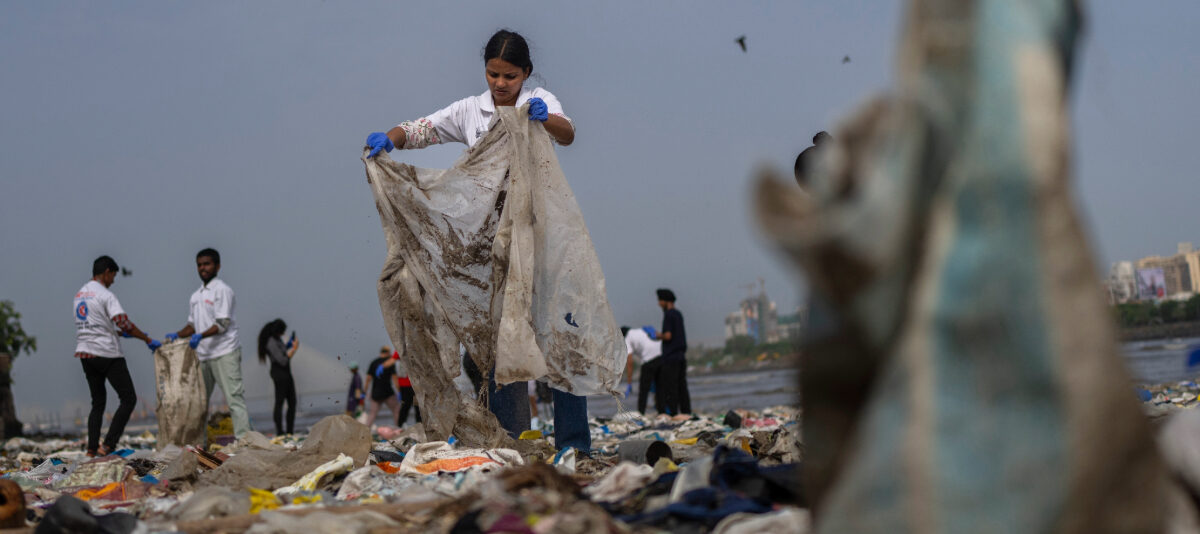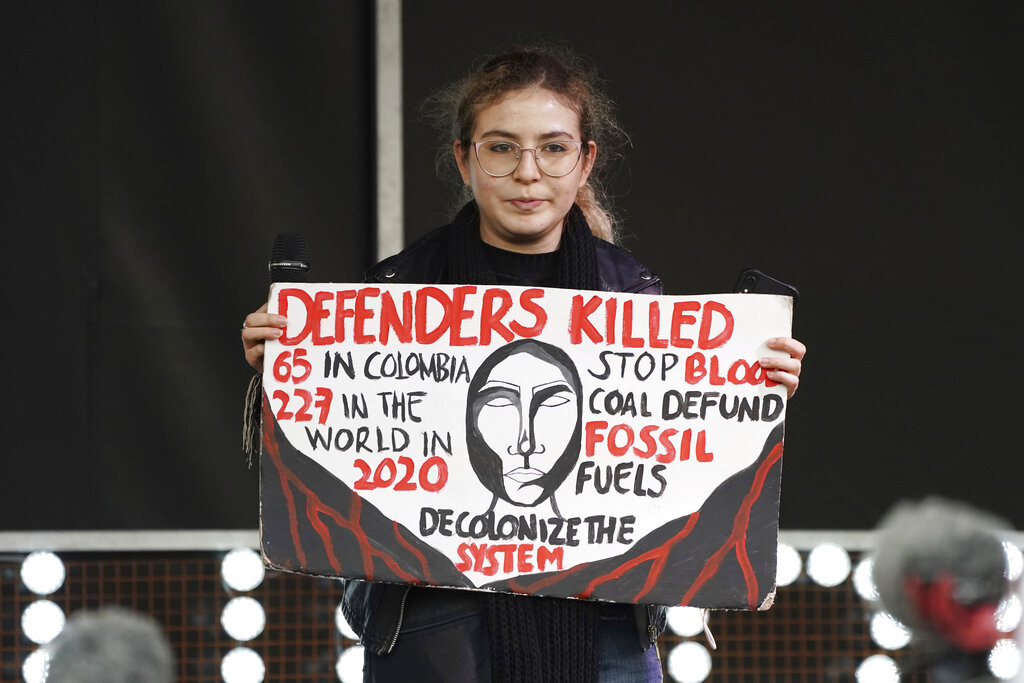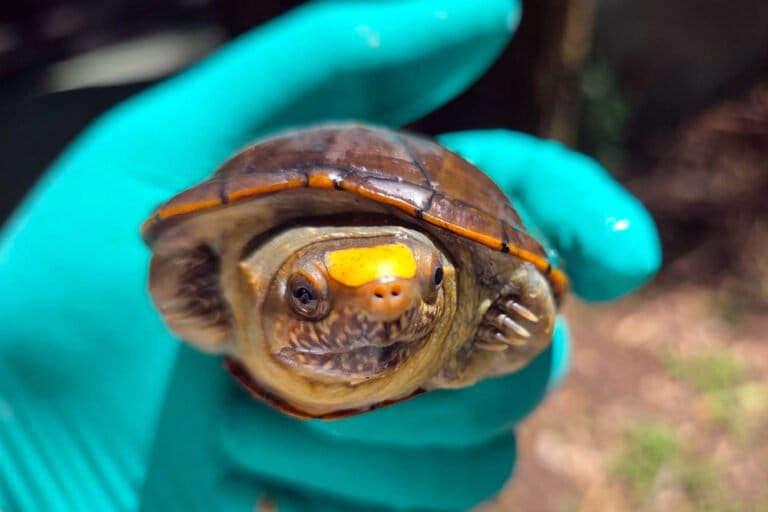- An American company plans to build what it dubs Tres Santos: 4,472 houses, a tank to store 400,000 liters of water, and two boutique hotels like one being built on Punta Lobos Beach in Baja California Sur
- At the time of his arrest, lawyer John Moreno Rutowski was representing the fishing community of Punta Lobos, which opposes the project because it supplants the beach and wetland area they’ve used for 100 years
- Four days after Moreno Rutowski’s incarceration, a federal judge confirmed the right of the fishermen to “protect their traditional beach against the threat of displacement brought about by Tres Santos,” according to Moreno Rutowski’s lawyer
- 62 days later Moreno remains in jail on unclear charges
PUNTA LOBOS, Mexico – Every morning at dawn, the fishermen of Punta Lobos take their boats out to the high seas to find shrimp boats and give bread, cookies, and soft drinks to the crew members in exchange for shrimp heads to use as bait.
They do this out of necessity. Deep down, they surely would prefer not to have to depend on this. The boats usually arrive at the beaches of Todos Santos, in Baja California Sur, from the neighboring state of Sinaloa. The fishermen practice trawling — taking in tons of shrimp and young sole, a species that artisanal fishermen work with and protect.
The shrimp heads are for the fishermen, and the small sole go back into the sea dead. For decades, the members of the Punta Lobos Fishing Cooperative have seen tons of dead fish thrown overboard and have spoken out about it with anger as they take their afternoon breaks.
But nowadays, this is the least of their problems: in 2013, the Mexican government approved the construction of a hotel on Punta Lobos Beach and the lawyer who defended the members of the cooperative, John Moreno Rutowski, has been incarcerated in the height of a full legal battle against the company developing the project.

In 2004, very far from there in Colorado (United States), real estate agency Black Creek Group developed a multimillion-dollar real estate business partnership. They named it “Limited Partnership Interests in Black Creek Mexico Residential Fund LP” to make investments “principally in Mexico,” as they stated to the U.S. Security and Exchange Commission, the agency responsible for making sure that laws are followed in the stock exchange.
It was the beginning of a story that would turn out to be similar to that of the fishermen, and is now changing the life and landscape within the calm town of Todos Santos. Todos Santos is a getaway for seamen, businesspeople, and American tourists located right in front of a whale sanctuary and beaches perfect for surfing. But the town also has a history of legal battles, displacements, protests, violent evictions, arrests, imprisonments, and loss of natural resources.
The beach that has long been the workplace of the fishermen—they figure that their parents and grandparents have worked there for the past 100 years—as well as the swamp and wetlands around it are being replaced by Hotel San Cristóbal. The hotel is part of the tourism development by Black Creek Group, whose motto is “the epicenter of well-being.” The company plans to build 4,472 houses in 25 years (Todos Santos has fewer than 6,500 inhabitants), a tank to store 400,000 liters of water, and two additional boutique hotels like the one being built on Punta Lobos Beach.


“After a life of working here, this mega-development group ‘Tres Santos’ appeared overnight saying that now they own everything, and the government tells us that now we have nothing,” lamented Rosario Salvatierra, one of the most experienced fishers in Punta Lobos.
The Secretariat of Environment and Natural Resources (SEMARNAT) of Mexico approved the Tres Santos project in 2013. But the Punta Lobos Fishing Cooperative decided to fight for their right to fish with the help of lawyer John Moreno Rutowski.
“We told him ‘look, John, we want you to help us,’ and he said ‘sure, I’ll get involved,’” remembers Salvatierra.
Moreno Rutowski —who has dual Mexican and American citizenship— wants the cooperative to file a lawsuit for the delimitation of the private property, and for the federal land to be established in accordance with its historical rights. This would give the members of the cooperative the possibility of continuing to fish there.
But on May 19, after more than two years of legal disputes, Moreno Rutowski was arrested in Todos Santos upon leaving his office. The lawyer was jailed in La Paz, the capital of Baja California Sur. He was accused of “dispossession” in a case filed in 2014 in which he defended Joella Corado, a young woman who also has dual citizenship, who wanted to recover a piece of land that her parents had inherited in Todos Santos.
The case was closed “as non-execution of criminal action,” which means that the Public Ministry determined that in that moment, there was insufficient evidence to continue with the accusation filed by the other party, the person who was said to own Joella Corado’s family property. But three years later, for no apparent reason, the case was revived, according to Moreno Rutowski’s lawyer, Arturo Rubio.
The fishermen, who don’t have much experience with legal disputes against companies as big as Black Creek, have put their faith in Moreno Rutowski, who—in addition to his legal knowledge—has an ideology that aligns with the fishermen and others who work with the ocean.
Moreno Rutowski is a lawyer in Todos Santos and also has the rank of chief within the Lakota Sioux tribe. He has ample experience opposing projects that threaten the environment.
“My roots, and the beliefs of my ethnic group and of the town that has taken me in, are intimately related with the land, with mother nature. Those beliefs follow the principle that the land does not belong to us; we belong to the land, and we have to take care of it and protect it. That is our obligation,” said Moreno Rutowski in an exclusive interview with Mongabay Latam from prison.
From her office in Todos Santos, Elena Moreno, John’s mother, said that her son’s time in jail forms part of “his journey” and that he has come to terms with thinking of it this way.
“I think that this is going to be a life experience, far from something that’s going to make me give up. This is strengthening my convictions,” said Moreno Rutowski with his hands up against the metal grate.
The journey to jail
One factor that caused angry public opinion is the way in which Moreno Rutowski was detained.
The Attorney General of Baja California sent three agents, who Moreno Rutowski knows, to arrest him. They did not show him a warrant, but simply asked for his voluntary cooperation. “They took me up to the unit and it wasn’t until they brought me to the Attorney General that they told me about the reason for my arrest,” remembers Moreno Rutowski.

To accuse Moreno Rutowski in a case that was closed in 2004 and that, according to his lawyer, doesn’t have a legal basis to be reopened, the Attorney General of Baja California Sur made an appearance in which he ordered Moreno Rutowski’s arrest. The important detail is that for this legal action to be effective, it was necessary for the accused to be present.
The Attorney General of Baja California Sur claims that Moreno Rutowski was present, while the defense maintains that this is false and that he was never present. To help prove this claim, Moreno Rutowski’s lawyer, Rubio, contacted Humberto Franco Merlos, an expert in criminology, graphoscopy, and dactyloscopy.
The specialist determined that Moreno’s signatures were falsified and that the documents were fabricated using photocopies from other court appearances. “The signatures from the alleged appearance are false, and so is the document with which he was supposedly identified,” assured Franco Merlos in a phone interview. This is repeated in the accused party’s statement as well as in the statement of the plaintiff and the two government agents.
“I realized that the signatures don’t belong to John Moreno [Rutowski], and to say that he did make an appearance, they put on that photocopy of his voter identification card. From the government documents, I realized that the credentials simply aren’t original; they are taken from another inquiry. They’re appearances that didn’t happen; that is very clear,” confirms Franco Merlos.
The evidence of the documents’ falsification was presented before the judge, but up to this point, it has not influenced his decisions.
According to Rubio, this evidence is sufficient reason for the trial to be cancelled, and even, he says, for research to be done to find the culprits. “It’s a felony; it’s a counterfeiting crime against the administration of justice. It’s a crime that is pursued ex-officio and that on its own nullifies all the conduct of the Public Ministry,” says Rubio.
Mongabay Latam tried to obtain a direct account of Moreno Rutowski’s case from the Attorney General of Baja California Sur via telephone, but up to this point it has been impossible. The only official account is one that was given in a statement on May 19, the day of the arrest. The statement briefly explains that “the affected person” was presented to the Attorney General (no date is given) in order to denounce Moreno Rutowski and Corado for the crime of dispossession committed on June 21, 2014.
That is, a person responsible for a real estate project on the land came back after three years to denounce Moreno Rutowski, and for that reason, the trial was reopened.
“When, in 2017, Tres Santos began to weigh the pressure between the court and the things that John [Moreno Rutowski] and his team were doing, that’s when the Attorney General brought back the old issues. They called the person in charge of the development, who told them that they did have the right,” explains Rubio.
The Public Ministry also explains in the statement that it did have sufficient evidence to arrest the fishermen’s representative.
“The real reason for my arrest is that we have put out five popular accusations in opposition to a real estate project called Tres Santos, which gives the developers permission to misinterpret our federal environmental laws and laws having to do with urban development and human settlements in the state,” said Moreno Rutowski, with two guards standing at his sides.

On May 24, five days after Moreno Rutowski’s capture, a federal judge confirmed the right of the Punta Lobos Fishing Cooperative to “protect their traditional beach against the threat of displacement brought about by Tres Santos,” according to a statement provided by the Cooperative. Nevertheless, the issue is still at hand.
Groundswell
The fishermen in the Cooperative and lawyer Moreno Rutowski aren’t the only ones who are convinced of the environmental damage that will be done to Punta Lobos Beach.
In Nov. 2015, specialist Paula Angeloni del Castillo, a biologist who specializes in oceanography and is a technical advisor for the fishermen of Punta Lobos, sent a letter to the Secretary of the Environment, Carlos Cota. In the letter, she warned of the consequences of construction on dunes and wetlands.
“Paradoxically, the first thing they did was destroy the mangrove adjacent to the beach and then started building on top of the first stretch of coastal dunes on Punta Lobos, considering that both of these actions put the environment at risk,” explained Angeloni del Castillo.

For Angeloni del Castillo, the coastal dunes play a central role in assuring the beach’s conservation. “Building like this, in this area which is so ecologically fragile, is not responsible — and the nature here has quickly begun to show that,” added the biologist.
Six months after Tres Santos cut out the dunes and filled the wetlands with cement to construct San Cristóbal Hotel, “a real ecological and social disaster began,” says Angeloni del Castillo. The beach in front of the hotel disappeared, and the waves reached the hotel’s walls. The rocks that had been put in place were thrown around and knocked against the boats, and the path that the fishermen took to work was eroded.
That path is the same one that the locals in Todos Santos take to get to the beach. It’s the preferred way because the waves are calm there, so it lets them get into the sea. Punta Lobos is also the closest beach to Todos Santos.
The company Tres Santos argued that the waves’ arrival up to their cement wall is due to a natural factor called “groundswell,” and offered to pay for the damage done to the fishermen’s boats and equipment.

“If the ‘groundswell’ hypothesis is correct,” added Angeloni del Castillo in her letter, “It begs the questions ‘how does a company that calls itself “green” build over the first stretch of coastal dunes?’ and ‘How does the SEMARNAT allow a retaining wall to be built so close to the sea?’”
In Feb. 2017, the head of SEMARNAT, Rafael Pacchiano Alamán, declared that “everything is in order” on the Tres Santos project, according to a note published on the web page The Baja California Informer.
Before the legal action, the fishermen created an eight-point petition directed at Tres Santos. The first point was that federal land, which is protected by law, should be set aside based on tidal patterns, which would safeguard the wetlands and mangroves. This did not occur, and the sea was the reason.
The fishermen’s petition to the investors also included a request to avoid construction that would cause erosion on the beach, as well as a request that the builders mark off the areas on which they would work. They also requested the “conservation and protection of the Lobos Estuary; no activity, construction, or use that does not foster and protect the wild flora and fauna of said habitat and wetlands in the area.”

Tres Santos claims that they have always sought dialogue with the fishermen and that they have made a series of proposals. They publicly offered to help those who keep their fishing licenses, and to pay for the damage caused by the waves that crash into their boats because of the groundswell. They also offered free access to the beach with a paved path, and to build new facilities for the fishermen.
After Salvatierra’s interview, the fishermen talked for about two hours about the case and agreed that they would go “to the bitter end” because of their distrust of Tres Santos.
But not all the fishermen are opposed to the project. Another group from Punta Lobos Beach, organized in the Todos Santos Cooperative, did agree to the company’s offers and gave up the area where they kept their boats. Now, the area has been replaced by the boutique hotel’s terrace, and the boats are next to those of the Punta Lobos Fishing Cooperative.
Mongabay tried to contact Tres Santos via telephone to hear their account, but at the time of this article’s original publication, they could not be contacted.
Police involvement
Moreno Rutowski was arrested during the “most pivotal” moment of the legal dispute, according to Rubio, his lawyer. His capture, says Rubio, was preceded by a total of five accusations presented by Moreno Rutowski and his team as they tried to block Tres Santos’ actions.
“The environmental impact is being fought about, and people are reporting damage to the dunes, wetlands, and beach. The damage to the mangrove is criminal. Just when the anti-development movement began, all of a sudden they began to harass John [Moreno Rutowski],” said Rubio.
The jailing, according to the defense, also was preceded by threats against Moreno Rutowski, for which he asked for guarantees from the Protective Mechanism for Defenders of Human Rights and Journalists.

In Todos Santos, there are even more people who are said to have received intimidating calls at night. Three activists, including BajaSurTV journalist Ricardo Madrazo, are denounced and walk down the street while using a legal measure which protects at-risk people who believe that their rights could be violated.
The dispute between the fishermen and Tres Santos switched from judicial authorities to social protests when, between 2015 and 2016, the fishermen blocked one of the entrances to San Cristóbal Hotel and stopped construction. The standoff, remembers Salvatierra, ended with the fishermen being removed on the morning of Feb. 2, 2016, by dozens of riot control police officers from the Baja California Sur Secretariat of Public Security as well as municipal police from La Paz.
BajaSurTV journalist Ricardo Madrazo documented their removal. Witnesses saw public officials and Tres Santos employees come with the police and even ask them to remove the fishermen.
Esteban Beltrán Cota, an employee of the Baja California Secretariat of Governance, along with Beatriz Ledesma, Tres Santos assistant manager of projects, witnessed the removal and the stakeout set up by the fishermen, which are shown in the published videos.
Moreno Rutowski made various requests for information about the operation to the institutions in charge of public security because, according to witnesses, and based on the presence of Tres Santos employee Ledesma, it was treated as an action that the company had requested.
Moreno Rutowski and his clients, who were removed, wanted to know whether the police had removed them by order of the State or were acting as private guards for Tres Santos.
La Paz’s local government told Moreno Rutowski that the Director of Public Security, Arturo Torres Valverde, and those he was in charge of, did have a part in the removal and admitted that they did not register the procedure. “There is no documentation that explains their actions in the way that you are requesting.” The Secretariat of Governance was also questioned by the lawyer, and he answered that there was no “instruction, document, authorization, nor mandate.”
In the 62 days that Moreno Rutowski has spent in jail, he has been as isolated as possible from the rest of the people in jail, staying inside his cell without calling any attention to himself and analyzing his legal situation.
“I don’t go through the common areas, I don’t get involved with anyone; I keep myself as reserved as possible and don’t get involved in anything that could put me at any type of risk,” said Moreno Rutowski from the prison’s phone booth.
From the other side of the booth, he assured us that his jailing is related to the power behind the Tres Santos project, which, with its wealth of legal resources, is trying to stop those in the Punta Lobos Fishing Cooperative from defending themselves.
The power of Black Creek Group
There is data that describes Black Creek Group’s strength within Mexico: in 2010, before the Tres Santos project began, Black Creek Group controlled $2.5 billion within Mexico. It’s no secret that the “right arm” of the company is Mexico Retail Properties (MRP), under which various affiliates are operated. MRP is controlled by Gerónimo Marcos Gerard Rivero, the brother-in-law of former President of Mexico Carlos Salinas de Gortari.
One of those affiliates is MIRA Companies, which uses investment funds to buy and administer properties in different parts of Mexico using the same concept as Tres Santos: with offers of well-being, a healthy life, and spirituality for potential American clients.

In this tranquil area, classified as a “magical town” by the Mexican government, MIRA came without any advertisements written in Spanish (all were in English) and settled into the surroundings. “It’s a destination for a demanding group of experienced travelers who long for an alternative to places like Phoenix or Cabo. Here, you find the exoticism and the charm of the old world. Here, you can live authentically,” says Tres Santos on their web page, where they promoted the construction of a “boutique” concept, similar to their existing buildings.
Meanwhile, on July 1, about 300 people marched near the breakwater in La Paz. Both Mexicans and Americans participated to demand the freeing of Moreno Rutowski as well as Corado. The march also functioned as a demonstration by members of the Lakota Sioux tribe.

On Tuesday, July 4, a hearing was held in which the defense hoped that the judge would set a bail amount for Moreno Rutowski and that he would be freed in the following days. According to Moreno Rutowski’s mother, Elena Moreno, the prosecuting party asked to suspend the hearing, but it still took place. “Now we’re waiting for the judge’s decision,” she said.
Elena Moreno, who was aware of the hearing, reported that the judge decided to take more days to “thoroughly review” the case. Moreno Rutowski’s release is not scheduled.
Moreno Rutowski said that he has received “certain threats,” which he considers a common situation inside a jail. “I spend most of the day inside my cell,” said Moreno Rutowski.
Today, it is clear to the fishermen that the company that has displaced them from their place of work has money of epic proportions.
“Tres Santos’ fingerprint is all over the subject of John Moreno [Rutowski]. We are daring to tell the government that this isn’t worth it,” said Salvatierra amid the hustle and bustle of the boats, arriving to deliver their goods to buyers.
This story was reported by Mongabay’s Latin America (Latam) team and was first published in Spanish on our Latam site on July 7, 2017.













